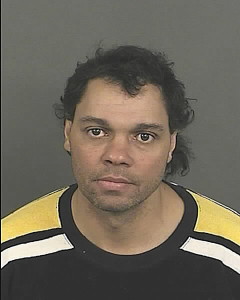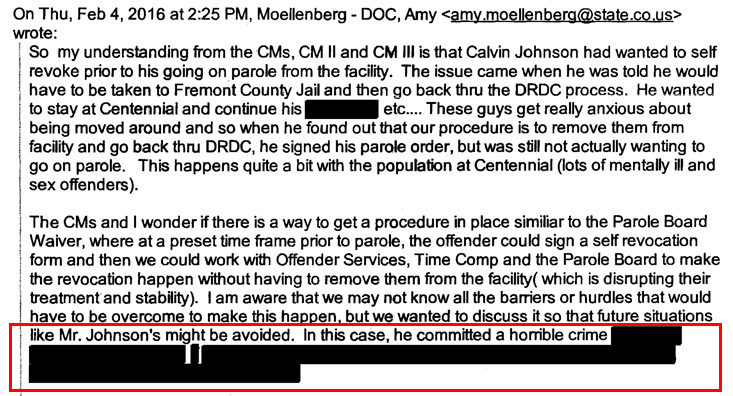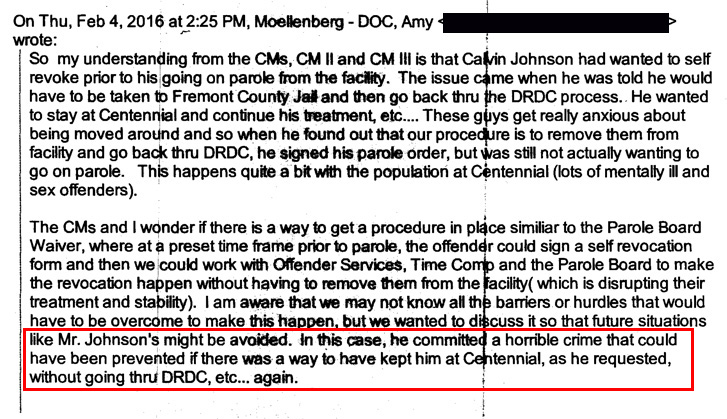In an email accidentally left unredacted by the Department of Corrections (DOC), a programs manager expressed an opinion – but one that clearly suggested the department could have prevented the murder of a homeless man, which allegedly occurred at the hands of a parolee.
Calvin Johnson was paroled by the DOC last September. But this January, he was accused of stabbing to death Teodoro Leon III, a homeless man, in an alley at 10th and Acoma in Denver.
In the February 4 email, Facility Parole Officer Amy Moellenberg wrote, “In this case [Johnson] committed a horrible crime that could have been prevented if there was a way to have kept him at Centennial, as he requested, without going thru DRDC, etc… again,” (emphasis added). But the highlighted portion of the sentence just quoted was redacted in 33 of 35 emails delivered to Complete Colorado in an open records request.
The redacted and unredacted versions:
Because an email might eventually be forwarded between multiple persons, or is responded to repeatedly in a chain, it often happens that a single email is provided numerous times to an open records request.
In this case, the same email was provided 35 times. In 33 of those cases, the full clause – “that could have been prevented if there was a way to have kept him at Centennial, as he requested, without going thru DRDC, etc… again”– is redacted.
Laurie Kilpatrick, spokeswoman for the DOC, said in an email that Moellenberg’s understanding of self-revoking is wrong because Johnson had to be released on his mandatory parole date by law.
When asked to justify the redaction – whether it met the criteria of information related to an ongoing investigation — a legal analyst with the DOC said the redactions were accurate and necessary.
“[The redacted phrase was] opinion based and stated prior to an official notice of charges. Potential impact on investigation,” Adrienne Jacobson said by email. “Release was deemed contrary to public interest pursuant to 24-72-305(5).”
“We provided around 1000 pages of emails. Many are duplicated. There is no hide the ball here. Redactions made were appropriate though there could have been and probably were missed redactions in a production this size,” Jacobson added.
Additionally, Jacobson noted the department had the right to withhold the documents because they are criminal justice records, and criminal justice agencies like the DOC have broader discretion to limit what is released, but said the DOC opted for the maximum amount of transparency by releasing the emails.
In the email, Moellenberg is referencing the fact that Johnson requested to self-revoke before he was even released on parole.
Kilpatrick says that, by definition, the notion of Johnson self-revoking wasn’t applicable in this case as referenced in the Mollenberg email.
An inmate cannot “self-revoke”. The statute re: self-revocation is related to Parolees and not Inmates. By law, Mr. Johnson had to be released from a DOC facility on his Mandatory Parole Date. Mr. Johnson never requested to self-revoke while on Parole. A request for self-revocation is presented to the Parole Board and not an automatic revocation.

Later as the email chain grew, Susan White, the Assistant Director of Offender Programs pushed back on Moellenberg’s assertion of Johnson’s desire to self-revoke.
“Incidentally, I met with Calvin a number of times and, to my knowledge, he did not express interest in self-revoking once he got out here,” White said.
The accusations of murder against Johnson became even more newsworthy after Complete Colorado broke the news that the Deputy Director of Parole, Alison Morgan, held Johnson up as a model of parole reforms being implemented in Colorado:
I’d like to tell you briefly about a, a parolee that, um, has some significant mental health issues.
He, uh, was acting out. He was threatening staff. He, uh, he has coped through his time in prison and on parole by threatening and being aggressive. And his thought was to do this again to hopefully um be revoked because he didn’t want to be accountable and he didn’t want to be on parole.
And our community-based organizations came together and the parole officer came together, uh, the mental health specialist, and we all sat down. And we came up with a plan to, to really challenge this parolee to try. And we, um, we each pooled a little bit of money and commitment to, to work with this parolee to launch him to be successful. Um, he didn’t completely like the idea of the plan we put together for him and he tried to play us off of each other.
And we all came back together again and said yeah it’s not to work that way. And ultimately he chose to, um, actually buy a tent, and he’s living in the alley behind our Lincoln Street parole office, but he’s figuring it out on his own. But it was a tremendous collaboration between parole, mental health, and the community-based organizations.
And, and that’s how all of this is working, really very successfully.
Since then, Complete Colorado has reported numerous other developments in the Johnson case, including:
- Johnson’s arrest by a parole officer for saying he should have “killed his victims” – but that arrest did not result in a revocation hearing before the Parole Board.
- Johnson was living in a tent just two blocks away from two businesses he had repeatedly harassed and seriously vandalized over a series of days in 2005 and 2006
- DOC Executive Director Rick Raemisch told the Governor’s office that Johnson’s “[r]ecord and conduct would not indicate capable of homicide,” despite Johnson’s repeated verbal threats and numerous aggressive outbursts.
Send us tips at CompleteColorado@gmail.com.
*Correction: Based on early press releases from the Denver Police Department and Denver District Attorney, the first edition of this article incorrectly identified the victim of the alleged murder as Leon Teodora. The victim’s name is Teodoro Leon III.




